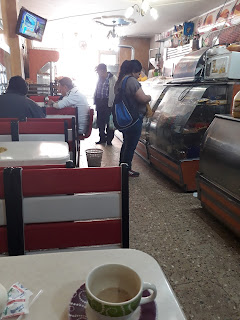We tend not to get too caught up in the left/right political tabs. It can be a bit simplistic to label somebody as purely leftist or rightist.
Very often people display traits and have beliefs that come from both sides, regardless of how they may view themselves. Put it all together and a lot of the time they're closer to the centre than anything else. And we tend to find that's not a bad place to be.
At a national level, Ireland as a whole is generally seen as being slightly more left than right in the political spectrum whereas it's the opposite with Colombia.
At a national level, Ireland as a whole is generally seen as being slightly more left than right in the political spectrum whereas it's the opposite with Colombia.
Of course, internally, for all countries, it's more complex and contested, but this overall perception is usually a good guide to a nation's psyche.
Nonetheless, and obviously enough, we do have those who not only see themselves as being 'hard left' or 'hard right' but they also conduct themselves in such a manner, contrived as it sometimes is albeit.
While we pretty much dislike fundamentalists of any type — they tend to be impossible to reason with, close-minded — extreme leftists are a particular case in point. The 'left misérables' (not to be confused with the more enjoyable Les Misérables) let's call them. And miserable in the English sense that is.
Now it would be fine, in theory anyway, if they went about their miserable existence on their own, yet they tend to try to want everyone to be miserable with them — or so it seems in any case. 'Happiness is a sin and the world must be rid of it', kind of thing.
We could look at it along the old Catholic versus Protestant lines. The traditional misery that the Catholic Church brought upon its flock contrasted with the Protestant individual 'freedom' to work and accumulate wealth; it's OK to smile (as long as you're working and making money).
The extreme leftist types are like those pious Catholics from times past: hardship and pain, the cornerstones of life.
 |
| Chairman Mao: A barrel of laughs (from Wikipedia). |
While we pretty much dislike fundamentalists of any type — they tend to be impossible to reason with, close-minded — extreme leftists are a particular case in point. The 'left misérables' (not to be confused with the more enjoyable Les Misérables) let's call them. And miserable in the English sense that is.
Now it would be fine, in theory anyway, if they went about their miserable existence on their own, yet they tend to try to want everyone to be miserable with them — or so it seems in any case. 'Happiness is a sin and the world must be rid of it', kind of thing.
We could look at it along the old Catholic versus Protestant lines. The traditional misery that the Catholic Church brought upon its flock contrasted with the Protestant individual 'freedom' to work and accumulate wealth; it's OK to smile (as long as you're working and making money).
The extreme leftist types are like those pious Catholics from times past: hardship and pain, the cornerstones of life.
A big difference, though, is that this belief system is accompanied by an amount of aggression — in a verbal and virtual (keyboard warrior) way if not always physical. Plus, these types come across as quite mean-spirited.
For sure the world is far from perfect. We've terrible inequality, rampant corruption, senseless violence and so on.
For sure the world is far from perfect. We've terrible inequality, rampant corruption, senseless violence and so on.
The majority wish it wasn't so and some of us try to make it better in whatever way we can. Doing that with a positive attitude, a happier disposition even in the face of adversity, generally garners better results.
Why not give it a go, left misérables? Who knows, you might even start to enjoy life. Perish the thought, eh?
_________________________________
Facebook: Wrong Way Corrigan - The Blog & IQuiz "The Bogotá Pub Quiz".
Why not give it a go, left misérables? Who knows, you might even start to enjoy life. Perish the thought, eh?
_________________________________
Facebook: Wrong Way Corrigan - The Blog & IQuiz "The Bogotá Pub Quiz".





